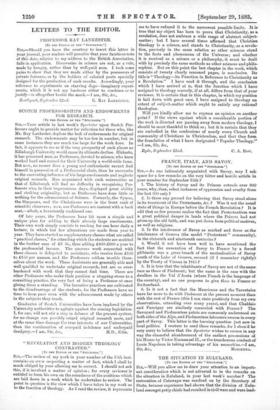SCOTCH PROFESSORSHIPS AND ENDOWMENTS FOR RESEARCH.
[To THE EDITOR OP THE "firEcreroa."]
Sts,—Your article in last week's Spectator upon Scotch Pro- fessors ought to provide matter for reflection for those who, like Mr. Ray Lankester, deplore the lack of endowments for original research. The endowments may be too few in number, but in some instances they are much too large for the work done. In fact, it appears to me as if the very prosperity of such places as Edinburgh University would cause its ultimate decline. Hitherto, it has possessed men, as Professors, devoted to science, who have worked hard and earned for their University a world-wide fame. But now, no sooner does a young and enthusiastic savant find himself in possession of a Professorial chair, than he succumbs to the enervating influence of his large emoluments and neglects original research. Men acquainted with such universities as that of Edinburgh will find no difficulty in recognising Pro- fessors who, in their impecunious days, displayed great ability and striking originality, but as Professors have done little or nothing for the advancement of Science. Formerly, the Symes, the Simpsons, and the Christisons were in the front rank of scientific observers ; now, our Professors are content with a back seat,—albeit, a luxuriantly cushioned one.
Of late years, the Professors have hit upon a simple and unique plan for adding to their already large emoluments. Their own work simply consists in reading for one hour daily a lecture, in which but few alterations are made from year to year. They have started as supplementary classes what are called "practical classes," for attending which the students are mulcted in the further sum of £3 3s., thus adding ktoo-aoo a year to the professorial income. The onerous work connected with these classes is delegated to assistants, who receive from £100 to £150 per annum, and the Professors seldom trouble them- selves about the work. These Assistants are generally able and well qualified to undertake original research, but are so over- burdened with work that they cannot find time. There are other Professors who make their position a stepping-stone to a consulting practice, the very fact of being a Professor at once giving them a standing. The lucrative practices are cultivated to the disadvantage of the students, for the Professors have no time to keep pace even with the advancement made by others in the subjects they teach.
Graduates of Scotch Universities have been implored by the University authorities to agitate against the coming legislation.
I, for one, will not stir a step in defence of the present system, for no change can possibly retard original research more, and at the same time damage the true interests of our Universities, than the continuation of overpaid indolence and underpaid drudgery.—I am, Sir, &c., Edio.


































 Previous page
Previous page